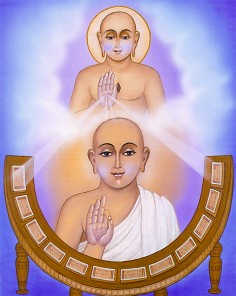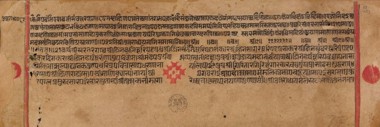Eleventh Lecture: The Very Learned
I shall explain, in due order, the right discipline of a houseless monk who has got rid of all worldly ties. Listen to me. (1)
He who is ignorant of the truth, egoistical, greedy, without self-discipline, and who talks loosely, is called ill-behaved and void of learning. (2)
There are five causes which render wholesome discipline impossible: egoism, delusion, carelessness, illness, and idleness: (3)
For eight causes discipline is called virtue, viz.: not to be fond of mirth, to control one’s self, not to speak evil of others, not to be without discipline, not to be of wrong discipline, not to be covetous, not to be choleric, to love the truth; for their influence discipline is called virtue. (4, 5)
A monk who is liable to the following fourteen charges, is called ill-behaved, and does not reach Nirvāṇa: (6)
If he is frequently angry; if he perseveres in his wrath; if he spurns friendly advice; if he is proud of his learning; if he finds fault with others; if he is angry even with friends; if he speaks evil even of a good friend behind his back; if he is positive in his assertions; if he is malicious, egoistical, greedy, without self-discipline; if he does not share with others; if he is always unkind: then he is called ill-behaved. (7-9)
But for the following fifteen good qualities he is called well-behaved: if he is always humble, steady, free from deceit and curiosity; if he abuses nobody; if he does not persevere in his wrath,; if he listens to friendly advice; if he is not proud of his learning; if he does not find fault with others; if he is not angry with friends; if he speaks well even of a bad friend behind his back; if he abstains from quarrels and rows; if he is enlightened, polite, decent, and quiet: then he is called well-behaved. (10-13)
He who always acknowledges his allegiance to his teacher,[1] who has religious zeal and ardour for study, who is kind in words and actions, deserves to be instructed. (14)
As water put into a shell shines with a doubled brilliancy, so do the piety, fame, and knowledge of a very learned monk. (15)
As a trained Kambōja-steed, whom no noise frightens,[2] exceeds all other horses in speed, so a very learned monk is superior to all others.[3] (16)
As a valiant hero bestriding a trained horse, with heralds singing out to his right and left, (has no equal),[4] neither has a very learned monk. (17)
As a strong and irresistible elephant of sixty years, surrounded by his females, (has no equal), neither has a very learned monk. (18)
As a sharp-horned, strong-necked bullock, the leader of the herd, is a fine sight, so is a very learned monk. (19)
As a proud lion with sharp fangs, who brooks no assault, is superior to all animals, so is a very learned monk (superior to all men). (20)
As Vāsudēva, the god with the conch, discus, and club, who fights with an irresistible strength, (has no equal), neither has a very learned monk. (21)
As a universal monarch with his fourfold army and great power, the possessor of the fourteen attributes of a king, (has no equal), neither has a very learned monk. (22)
As Śakra the thousand-eyed, the wielder of the thunderbolt, the fortress-destroyer, the king of gods, (has no equal), neither has a very learned monk. (23)
As the rising sun, the dispeller of darkness, who burns as it were with light, (has no equal), neither has a very learned monk. (24)
As the moon, the queen of the stars, surrounded by the asterisms, when she is full at full-moon, (has no equal), neither has a very learned monk. (25)
As a well-guarded storehouse of merchants, which is filled with grain of many kinds, (has no equal), neither has a very learned monk. (26)
As the best of Jambū[5] trees, called Sudarśanā, which is the abode of the presiding deity, (has no equal), neither has a very learned monk. (27)
As the best of rivers, the ocean-flowing stream Śītā[6] with its dark waters, (has no equal), neither has a very learned monk. (28)
As the best of hills, high mount Mandara, on which various plants shed a bright lustre, (has no equal), neither has a very learned monk. (29)
As the ocean of inexhaustible water, the delight of Svayambhū,[7] which is full of precious things of many kinds, (has no equal), neither has a very learned monk. (30)
Monks who equal the ocean in depth, who are difficult to overcome, are frightened by nobody (or nothing), and are not easily assailed, who are full of extensive learning and take care of themselves, will go to the highest place, after their Karman has been annihilated. (31)
Therefore, seeker after the highest truth, study the sacred lore, in order to cause yourself and others to attain perfection. (32)
Thus I say.
 Ganadhar Sudharma Swami
Ganadhar Sudharma Swami
